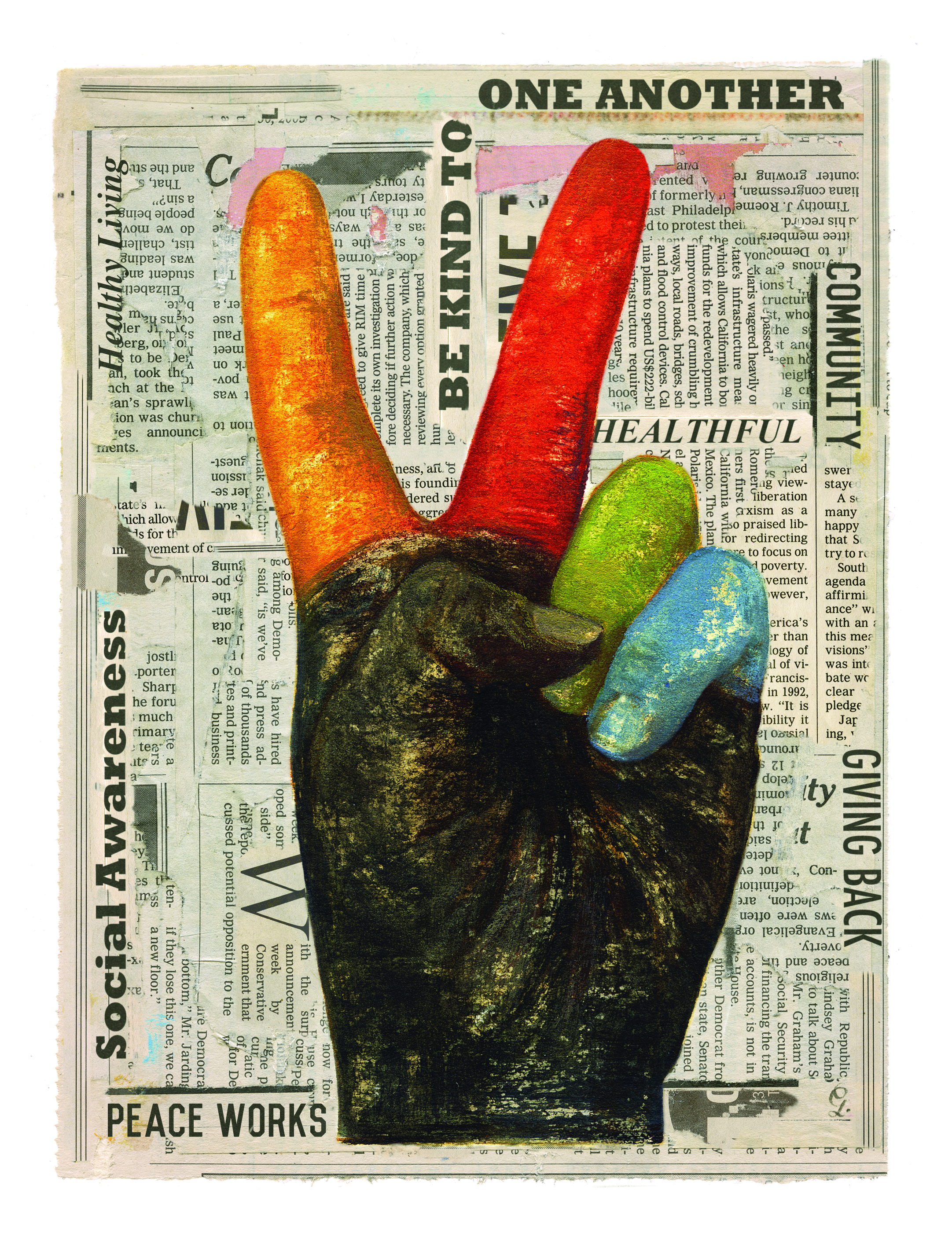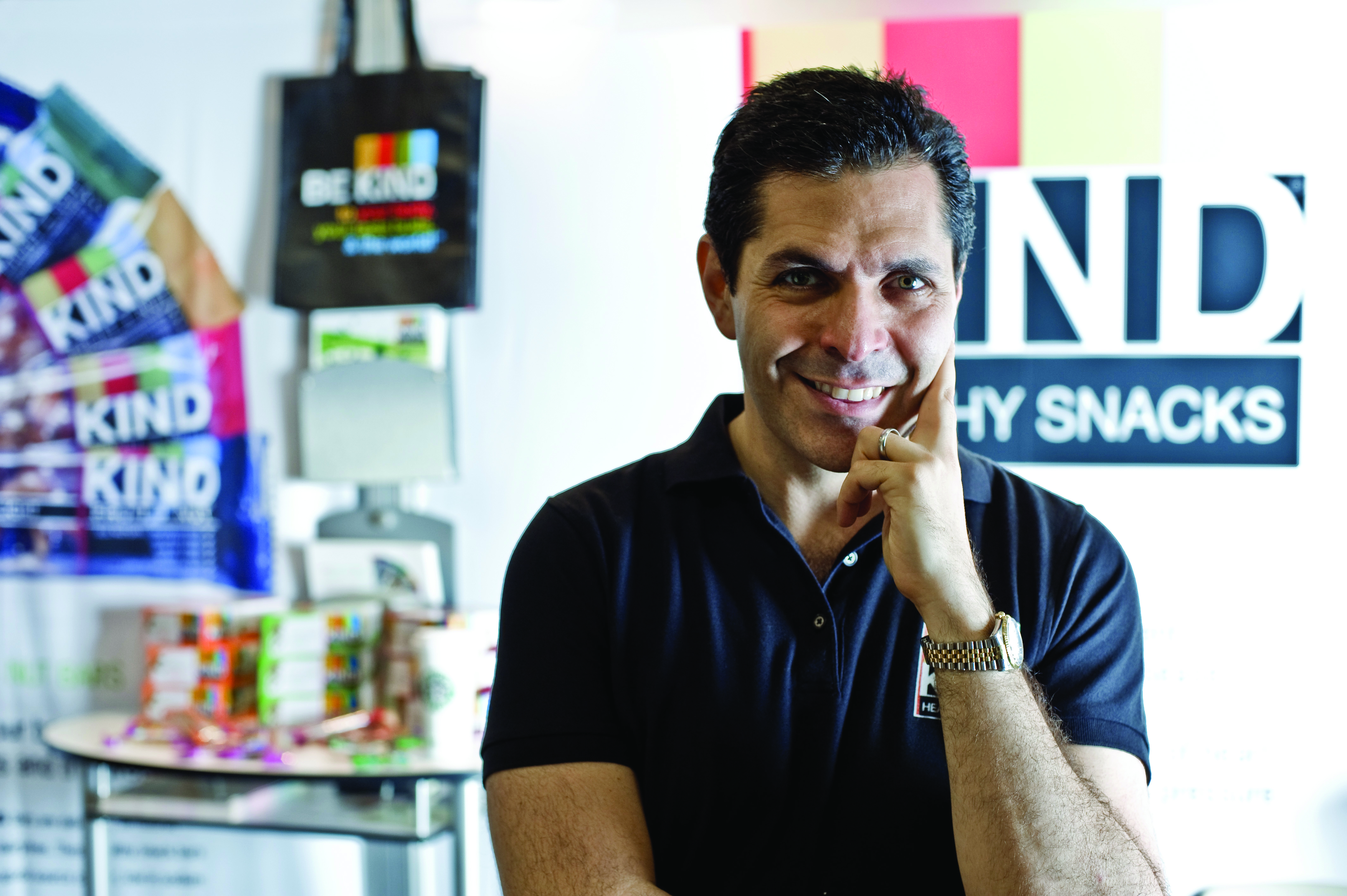Peace, Kindness, and Understanding – and Snacks
Sometimes the spark for a new business comes from out of the blue. For Daniel Lubetzky, it typically comes from food.
The founder of two food companies, KIND Healthy Snacks and PeaceWorks, Lubetzky is a serial “social entrepreneur” who has made his life work about much more than the bottom line. This is a man deeply motivated to help bring about peace in the Middle East—and in everyday interactions. He wants to inspire simple acts of kindness and make the world a better place—one snack at a time.
Kind seems an unusual name for a snack bar—at first. The name “KIND” for the now ubiquitous nut bars has very little marketing spin behind it. Instead, it gets to the core of the company’s mission.

“We wanted the name to coalesce around human aspirations,” says Lubetzky, JD ’93. “What guided us was the product—something delicious that didn’t sacrifice quality, was kind to your body, and kind to the world.”
The idea for the bars came from a simple observation: a dearth of wholesome snacks at airports.
“I was running PeaceWorks, selling its tomato spreads, and traveling all over the United States and the world. But the snacks I had access to while on the road either tasted like cardboard, were too indulgent, or didn’t taste like real food. I was looking for a healthy snack that I could feel good about eating, but I couldn’t find one,” says Lubetzky. So he came up with one himself, rolling up his sleeves and working with nutritionists and business partners on the smallest details. As well as the name.
Launched in 2004, KIND Healthy Snacks makes a variety of KIND bars that are now sold around the country and the globe—with flavorful combinations such as cashew, cherry, and dark chocolate spurring on sales. And Lubetzky has kept his sleeves rolled up working closely with his staff on the day-to-day. “Ten years after launching, we are fortunate that it’s among the fastest growing companies in the U.S.,” he says.
But sales alone aren’t what drive this company. Lubetzky hopes to inspire a kindness revolution, with “giving back” and “acts of kindness” central to the KIND mission.
Before social entrepreneurship became a whole area of study in business schools, Lubetzky was already living it. He launched his first company, PeaceWorks, in 1994, not long after graduating from Stanford Law. He had a hunch that an essential, yet seemingly ignored path to peace in the Middle East was through joint Palestinian and Israeli business ventures. This idea first started to take shape when he was still in college and he wrote his senior thesis on the topic, “The Influence of Economic Factors in Resolving the Arab-Israeli Conflict.”
“I am deeply committed to helping to resolve the Arab-Israeli conflict. And I’m also a good businessman,” says Lubetzky, who started his first business venture selling watches when he was still in high school. He draws a direct line to his parents for his inspiration. His father was still a young boy when sent to the Dachau concentration camp. He survived the Holocaust and immigrated to Mexico, where he met Lubetzky’s mother, who was from one of only a handful of Jewish families in a rural part of Mexico. His father only had a third- grade education, yet he worked hard in a jewelry shop, finally opening his own and becoming a successful businessman. Lubetzky describes his mother as a natural bridge-builder, who encouraged him to reach out to people—even those who were different from him—and he has taken that lesson to heart. But his father’s experience in the Holocaust is what really motivates him. “I remember very clearly his stories from the concentration camp and why we need to prevent that from ever happening again. And that’s why I do what I do.”
While at Stanford law, Lubetzky continued working on the idea of fostering peace in the Middle East through joint business ventures. A seminar taught by Byron Sher, a professor emeritus who went on to serve in the California State Assembly and Senate, was particularly helpful. The key assignment was to write a piece of legislation. “My legislative proposal laid out ways that the U.S. Congress could encourage joint ventures between Arabs and Israelis and Americans,” he says. After law school, Lubetzky traveled to the Middle East on a fellowship and developed the idea further (he later published the proposal in the Michigan Journal of International Law). While in Israel, a food caught his attention—a sun-dried tomato spread.
“It was so delicious—I downed an entire jar,” says Lubetzky. “In the early 1990s we didn’t see sun-dried tomato much in the U.S. And I had never had it.” Intrigued, he located the owner of the business and discovered that it had just gone bankrupt. “He had been sourcing his tomatoes from Italy and jars from Portugal. It was too expensive.” So Lubetzky drew on his own research to show that sourcing nearby—jars from Egypt, olive oil from Palestinian farmers, and tomatoes from Turkey—could make for a more viable business. He invested his own savings into the relaunched venture and named it PeaceWorks. Described as a “not ONLY for profit” company, PeaceWorks became “moderately successful” bringing together neighbors for business and for peace. In addition to producing the spreads, the company also sponsors various initiatives to build bridges in the Middle East, particularly among Israelis and Palestinians. In 2002, the PeaceWorks Foundation launched the OneVoice Movement, an international grassroots effort focused on amplifying the voices of moderate Israelis and Palestinians and pressing for peace in the region. But all this took a lot of effort.
“I gave up my law firm career, emptied my briefcase, and filled it with jars of this tomato spread and was literally going door-to-door selling it,” he says. “I was an attorney with no experience in the food industry. I made mistakes but I also learned a lot.” And there have been challenges. Lubetzky recalls a low point early on during some of the worst periods of terrorism in Israel and the Palestinian territories, when he considered winding the company down. “I wondered if it was a modern mirage, if what I was doing could really make a difference,” he says. When he raised these doubts with his suppliers, they were clear about the importance of his efforts. “They said, ‘This is our livelihood; this is our future. You can’t just walk away. We need to raise our voices even louder and stand up against extremism even more.’ It was an interesting wake-up call for me—and made me realize that people’s lives depended on this. It wasn’t just a paper for a class. I needed to be steadfast and serious.” PeaceWorks is still in business—selling its spreads manufactured by an unlikely group of individuals—and encouraging community.
Lessons drawn from that venture, as well as the business connections he made, helped Lubetzky launch KIND Healthy Snacks and quickly turn it into a viable company. According to its statistics, the nearly 10-year-old, Manhattan-based company has grown retail distribution from 1,000 doors in 2004 to 80,000 this year, with its bars selling everywhere from Trader Joe’s to Target and Whole Foods to Walmart. And KIND bars have the distinction of having the highest “velocity” in the entire nutrition bar category. “KIND Dark Chocolate Nuts & Sea Salt is the single fastest turning SKU [stock-keeping unit] in the entire category, out of over 1,000 products in the space. Within the healthy snack bar segment that we pioneered, KIND bars hold spots one through twelve for highest turnover on a same store basis,” says Lubetzky.
At KIND, business profits and social profits go hand in hand. Staff is reminded of the company’s mission not simply by its name but also through concrete programs and the way marketing weaves social responsibility into its programs. Lubetzky describes the KIND Movement, the company’s platform for social change, as “a quarter of a million fellow kind-aholics that every month receive a mission from the company to do a signature kind act. They log their kind act onto our website and then we do a bigger act of kindness,” he says, ticking off examples such as reuniting war veterans with their families, giving hundreds of shoes to homeless children, and donating school supplies to underserved areas.
“Kindness is a very rare gift and power,” he says. “It’s one of the only forces in nature that is a ‘net happiness aggregator,’ with both the doer and the receiver better off.”

While Lubetzky did not plan this career—he thought he was going to be a practicing lawyer and then use that experience to become a diplomat working for peace in the Middle East—he is glad he found this niche. “I don’t know if the term social entrepreneurship even existed when I was studying, though companies like Ben and Jerry’s were already doing it,” he says. “I was looking for a way to bring my passions together. And those passions are finding peace in the Middle East, building bridges, and encouraging kindness. The conduit happened to be business, the first opportunity happened to be a jar of sun-dried tomato spread.”
Lubetzky has led by example with his ventures. “Companies have combined business and social causes before, but the small way in which I think I’ve contributed is by pioneering a model where the social and the business are integrated with the DNA of the entity. And the business model actually advances those goals together, rather than separately,” he says. “You advance the social and the business objectives in tandem—the more products that are sold, the more you can foster cooperation, the more you advance the social and business mission.”
Lubetzky has been widely honored for his efforts too. Since 2004, he has been recognized by organizations including the World Association of NGOs, the Catholic Theological Union, The Monitor Group, and the National Committee on United States-China Relations. He received the King Hussein Humanitarian Leadership Prize from Queen Noor, Fast Company magazine gave him its Social Capitalist Award as one of “43 Entrepreneurs Who Are Changing the World,” and the World Economic Forum recognized him as a Young Global Leader. In 2008, he received the Skoll Award for Social Entrepreneurship, accompanied by a $1,000,000 grant to the PeaceWorks Foundation. In 2009, Businessweek named him among “America’s Most Promising Social Entrepreneurs” and TIME magazine named him among “25 Responsibility Pioneers” of social innovation. In 2010, Entrepreneur magazine selected him as Entrepreneur of the Year. In 2013, he was named among Advertising Age’s Creativity 50 most creative people, Goldman Sachs’ Builders and Innovators named him among 100 Most Intriguing Entrepreneurs, and he received an Ernst & Young Entrepreneur of the Year® 2013 Award.
With two ventures already under his belt and a third launched last year—Maiyet, a clothing company that is bringing items crafted in developing countries to high-end retail outlets—Lubetzky is enjoying his success. But he’s keeping his eye on the real prize.
“My father told me about a concentration camp soldier who gave him a scrap of food. It doesn’t sound like an act of kindness to us, but it meant a lot to my father and the soldier took a big risk to do it. Kindness actually matters very much,” he says. SL
